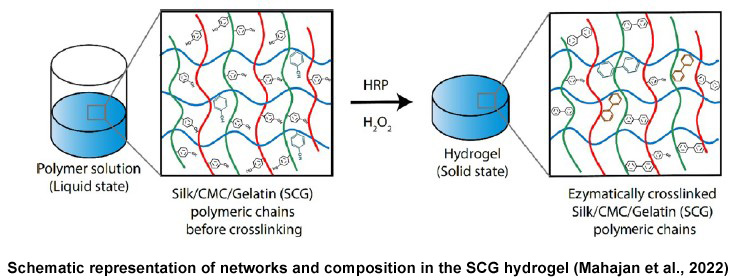Bioinspired Injectable Hydrogels Dynamically Stiffen and Contract to Promote Mechanosensing-Mediated Chondrogenic Commitment of Stem Cells.
Mahajan A, Singh A, Datta D, Katti DS.
ACS Applied Materials & Interfaces. 2022 Feb 4;14(6):7531-50.
 The articular cartilage is a load-bearing tissue that acts as a shock absorber and ensures smooth movement of joints. Thus, not surprisingly, articular cartilages are highly prone to acute and chronic injuries, leading to joint impairment and disability. Further, due to limited number of tissues specific progenitor cells, compounded by lack of vasculature, cartilage has a limited capacity to repair or regenerate. Owing to which there is a dire need to develop strategies that can address the wear and tear of cartilage. Most of current tissue engineering strategies involving hydrogel-based scaffolding systems, that while promising, offer poor mechanical strength due to high-water content. In this study conducted by Prof. Katti and team, they display, a triplenetwork injectable hydrogel system, engineered using Bombyx mori silk fibroin, carboxymethyl cellulose (CMC), and gelatin that displayed a simultaneous increase in both stiffness and contraction over time, thereby imparting a four dimensional (4D) evolving niche to the cells. While resilience was provided by CMC, the dynamic alterations in the hydrogel matrix were attributed to the formation of β-sheets in silk. The engineered contraction facilitated condensation of cells that mimicked an important step during cartilage development. Subsequently, this led to downregulation of YAP signaling and enhanced chondrogenic commitment of stem cells. More importantly, the in vivo study showed that the ectopically regenerated cartilage was mature and closely resembled native articular cartilage. The study could prove to be a major step forward in area of cartilage biology and repair.
The articular cartilage is a load-bearing tissue that acts as a shock absorber and ensures smooth movement of joints. Thus, not surprisingly, articular cartilages are highly prone to acute and chronic injuries, leading to joint impairment and disability. Further, due to limited number of tissues specific progenitor cells, compounded by lack of vasculature, cartilage has a limited capacity to repair or regenerate. Owing to which there is a dire need to develop strategies that can address the wear and tear of cartilage. Most of current tissue engineering strategies involving hydrogel-based scaffolding systems, that while promising, offer poor mechanical strength due to high-water content. In this study conducted by Prof. Katti and team, they display, a triplenetwork injectable hydrogel system, engineered using Bombyx mori silk fibroin, carboxymethyl cellulose (CMC), and gelatin that displayed a simultaneous increase in both stiffness and contraction over time, thereby imparting a four dimensional (4D) evolving niche to the cells. While resilience was provided by CMC, the dynamic alterations in the hydrogel matrix were attributed to the formation of β-sheets in silk. The engineered contraction facilitated condensation of cells that mimicked an important step during cartilage development. Subsequently, this led to downregulation of YAP signaling and enhanced chondrogenic commitment of stem cells. More importantly, the in vivo study showed that the ectopically regenerated cartilage was mature and closely resembled native articular cartilage. The study could prove to be a major step forward in area of cartilage biology and repair.


